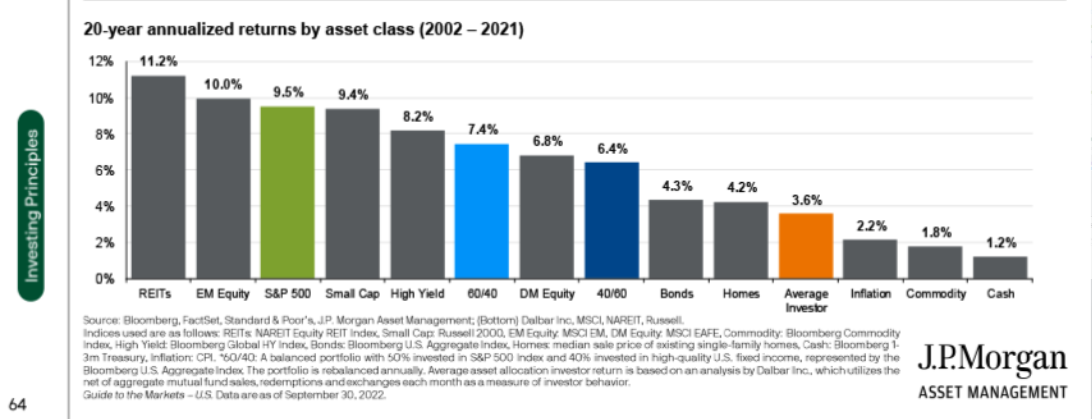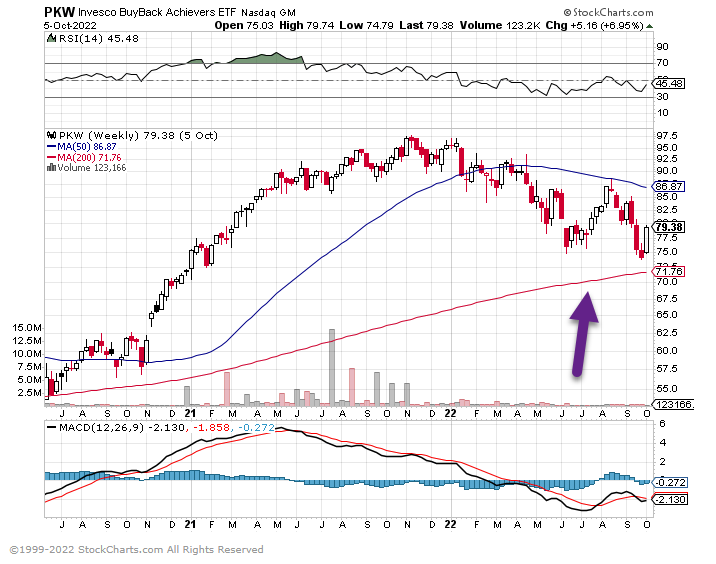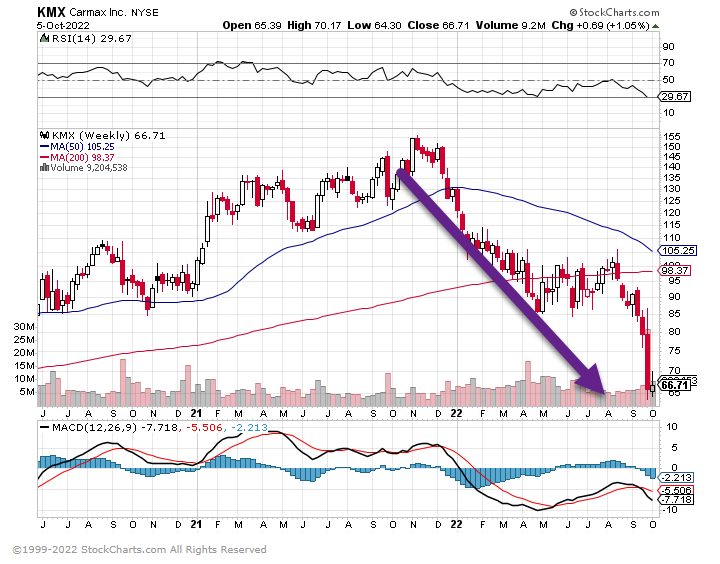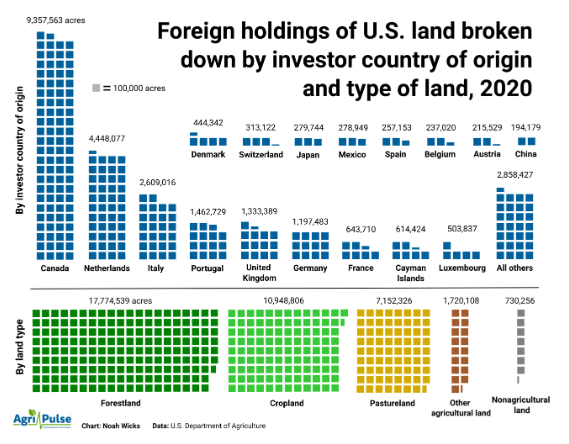1. 2000-2021 Returns…S&P Not the Winner.
JP Morgan Guide to the Markets

https://am.jpmorgan.com/us/en/asset-management/adv/insights/market-insights/guide-to-the-markets/?gclid=Cj0KCQjw-fmZBhDtARIsAH6H8qi8JUsh8a2jMW-dL7i9oVNRYNU1duITvfMD4z-MSZU8krg_Ws_nR9waAoyoEALw_wcB&gclsrc=aw.ds
2. Presidential Cycle Stock Market Seasonality
Dan Stratemeier Managing DirectorEquities, Event Driven Strategies-Jefferies

3. Rally in Market Happen without Stock Buybacks and Retail Investor Buying.
From Dave Lutz at Jones Trading.

This rally has been occurring with nearly 70% of companies are in the “Buyback Blackout” ahead of Earnings

And without retail participation – According to AAII survey results, retail investors are selling in size to raise cash for the first time since the COVID crash.
4. PKW Buyback ETF Holding 200 Week Moving Average

5. Carmax -55% …No More Used Car Price Inflation

6. Canadians Own 32% of American Farmland

https://www.agri-pulse.com/articles/17107-foreign-interests-keep-buying-us-acreage-with-focus-on-southwest
7. Solar Power and Batteries Account for 60% of Planned New U.S. Electric Generation
From Barry Ritholtz Blog

https://ritholtz.com/2022/10/10-thursday-am-reads-405/
8. Sequencing Human Genome Getting Cheaper and Cheaper.
CHARTR.com Nobel efforts Svante Pääbo, a Swedish scientist, has won the Nobel Prize for his reconstruction of a full genome for Neanderthals and other extinct hominins. Pääbo’s prize, officially the Nobel Prize in Physiology or Medicine, carried a 10m Swedish Kronor prize (~$920k USD) and was the first of the six awards to be announced this week. The impressive work, which saw Pääbo pioneer methods to extract and analyze DNA from Neanderthal bones, is experimentation that will hopefully get easier over time, as the cost of genome sequencing continues to fall.
Indeed, Illumina — a company which has some 80% share of the global gene sequencing market — unveiled two new sequencing instruments this week. The company claims these tools will bring the cost of sequencing a full genome to less than $240 and give the company capacity to sequence ~20,000 genomes a year, up from 7,500. Tell those numbers to a scientist from the year 2000, when one human genome sequence would cost close to $100m, and they’d likely laugh you out of the lab.
The whole gene
What about that $99 at-home DNA test kit you bought online? That only takes a snippet, usually around 0.02% of your DNA, using clues to predict your disease risks and ancestry.
Whole-genome sequencing, on the other hand, provides 4,000 times more data on your DNA than at-home tests, and is likely to lend a hand in major medical breakthroughs. The process helped the speedy creation of vaccines for Covid-19, can help the early detection of disease outbreaks, identify inherited disorders and even characterize genetic cell mutations in cancer patients.

9. RANKED: Alaska, New Mexico and Tennessee top the list of states with the highest rates of murder, rape and other violent crime, while Maine, New Hampshire and Vermont have the lowest, study says
- Alaska has the highest violent crime rates: 837.8 per 100,000 people
- The Last Frontier has more men and more heavy drinkers than elsewhere in the U.S.
- Lawmen are spread thin across the vast 665,000 square mile territory
- Indigenous people also make up 19.6 percent of the state’s population
- Low-crime states like Maine and Vermont benefit from ‘social safety nets’, experts say
- Still, most crime is ‘hyper-concentrated’ in rough parts of a city, says expert Rafael Mangual
By JAMES REINL, SOCIAL AFFAIRS CORRESPONDENT, FOR DAILYMAIL.COM

10. 8 Foods That Contribute to Anxiety and Depression
… and how to limit or avoid products that can jeopardize mood.
KEY POINTS Susan McQuillan
- Some foods are likely to affect your levels of anxiety and depression more than others.
- Commercially processed foods can negatively affect your mental health.
- Common junk foods are the worst offenders; they contain too much sugar or unhealthy fats, and are nutritionally depleted.
When university and medical school researchers from North and South America* set out to explore the theory that processed foods contribute to poor mental health, they found ultra-processed foods (UPF) to be the worst offenders. Ultra-processed foods are commercially prepared convenience food products that contain little to no whole food ingredients, often lack essential nutrients, and often contain additives, such as flavorings, colorings, and other products that make the food more appealing to consumers. In other words, they in no way resemble the original food sources from which they are made.
UPF products are generally quick and easy to prepare or ready to eat out of their packaging, and they are often less expensive than whole foods, especially when they are available from generic or store brands. That helps explain why more than 70 percent of all packaged foods sold in the United States are deemed UPF, and those food products represent around 60 percent of all calories consumed in this country.
Upon review of self-reported, nationally representative dietary records of more than 10,000 men and women age 18 and older, the study authors were able to name the eight UPFs most commonly consumed. These include:
- Sugar-sweetened drinks
- Reconstituted meat products
- Packaged snack foods
- Chips
- Breakfast cereals
- Cookies
- Cake
- Bread
The researchers also collected data from the participants to measure three specific mental health symptoms: general mild depression, number of anxious days, and number of mentally unhealthy days. They found that those participants who reportedly consumed the most UPFs had a significantly higher rate of mild depression and reported significantly more anxious and mentally unhealthy days.
Previous research has found that food additives used in UPF, such as artificial sweeteners and emulsifiers, are linked to changes in the brain, increased inflammation, and altered metabolism. Other studies have found that people who lack essential nutrients in their diet and consume large amounts of food high in sugar are at significantly higher risk of developing depression and anxiety than those who eat a healthier diet, such as a Mediterranean-style diet that’s higher in natural, nutrient-rich, and less processed foods, such as seafood, vegetables, olive oil, legumes, and nuts.
article continues after advertisement
*Researchers are affiliated with Charles E Schmidt College of Medicine at Florida Atlantic University, University of Sao Paulo, University of South Carolina Department of Medicine, Georgetown University Medical Center, and University of Kentucky College of Medicine.
Facebook image: Flotsam/Shutterstock
LinkedIn image: Trzykropy/Shutterstock
https://www.psychologytoday.